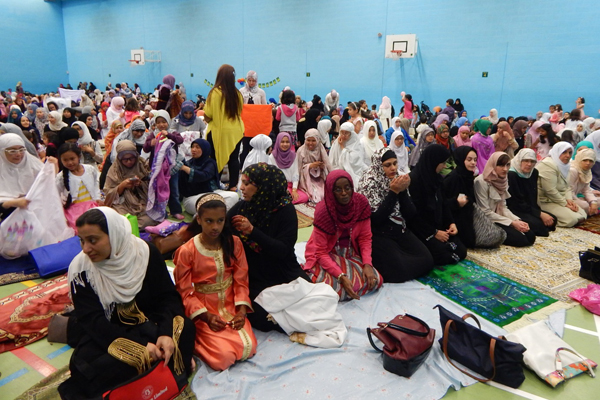July 24, 2015, by International students
Eid al-Fitr in Nottingham
Eid al-Fitr (also known as Id al-Fitr or Eid ul-Fitr) falls on the first day of Shawwal in the Islamic calendar. It marks the end of the month-long fast of Ramadan and the start of a feast that lasts up to three days, depends on the countries. This day is recognised from the astronomical estimate from the sight of the new moon.
In Indonesia, the sound of Takbir echoes from all mosques on the eve of Eid al-Fitr. In most cities, children go to the street for carnival where they play some kind of drums and chant Takbir. Sometimes people also light firecrackers or fireworks to make the night even merrier. Most of my Indonesian friends and I, who have been living in Nottingham, really miss this ambience and also our families. In order to ease our homesickness, the Indonesian Society arranged a potluck feast on the day of Eid al-Fitr. So, that night we gathered in several students’ homes and made ourselves busy by preparing various kind of traditional foods, snacks and drinks.
On Thursday, 16 July 2015, around 7pm Islamic Cultural Center/London Central Mosque announced that Eid Fitr would fall on Friday 17 July 2015. Although Eid al-Fitr is not a national holiday in the United Kingdom, many Islamic businesses and organisations alter their business hours during this event. The event begins with morning prayer, either at an outdoor prayer ground or a mosque. Muslims typically enjoy a small breakfast ahead of morning prayers and then followed by feasting and celebrations among family and friends.
Since the University Campus Sports Hall where Eid Prayer usually takes place is currently under revonation, this year’s Eid al-Fitr prayer took place in the Jubilee Campus Sports Centre. The entrance was separated for Men and Women and the Sport Centre staff welcomed us at the entrance door. The prayer which was led by Imam Muhammad Lihyani from Saudi Arabia was started at 8am. There were 25,000 people who joined the prayer. They were Muslims from Pakistan, India, Bangladesh, Indonesia, Malaysia, Brunei Darussalam, Middle East and North Africa countries, and many others.

While feasting is central to Eid, there are also religious obligations connected to the festival. Muslims will not only be celebrating the end of fasting, but giving thanks to God for providing them with strength throughout the month of Ramadan. Eid is also a time of forgiveness, self-reflection and giving to charity. After the prayer, the preacher gave a speech about what Muslims, especially those who currently study at The University of Nottingham as an intellectual, can do to express their identity as a Muslim and some actions that Muslims should do to change negative stereotype towards them.
Indonesians have particular traditions when celebrating Eid. However, since we currently live abroad, instead of visiting friends and relatives after the prayer where a lavish feast is served like we normally did in our home country, we gathered in one of the students’ houses and brought various foods that we prepared from the night before. The crowd, the food and the feeling of togetherness made us slightly forget our longing of family and its togetherness. Denissa Faradita, Indonesian student who is studying Msc in Advanced Nursing said “Although we are far away from our family and relatives, we find new family here because family is not merely about blood”.
Besides the celebration event that was held by Indonesian Society, Islamic Society University of Nottingham also held an Eid Party on Sunday the 19th of July from 1pm to 6pm in the Portland Building (Atrium for brothers, SU Hub for sisters), a celebration with friends and family, with free food, drink and activities for children, they also awarded the Qur’an competition winners in this event.
Meredita Susanty, an international student from Indonesia studying MSc Management and Information Technology at The University of Nottingham.
No comments yet, fill out a comment to be the first


 English
English
Leave a Reply